Andrew Barnes
- 1969
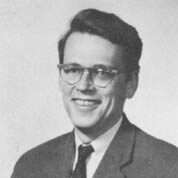
Fellowship Title:
- Urban Problems in Europe
Fellowship Year:
- 1969
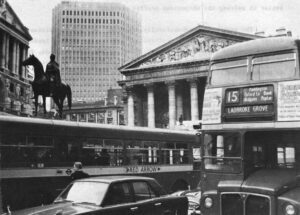
Who Rules The Streets?
London – London has the sort of local government setup American cities are told they ought to want. After years and decades of Royal Commissions, White Papers and endless talk, the whole patchwork of vestiges and beginnings was scrapped in 1965. A fresh start was made, the forms of government designed to match the realities of the city. London also has strangling traffic problems. Cars came to London a little later than to the U. S., but they have come in fleets. How to make the city serve the automobile better is a constant topic in the press, the government and in casual conversation. The question is, does a streamlined local government do any better at solving the ubiquitous traffic problem? The government, schematically, is this: elected politicians direct a highly specializedg professional staff. The Greater London Council provides certain things, like planning and through roads, for the whole metropolis. The 33 boroughs handle more local affairs such as trash collection and schools. The boroughs, because they are smaller, are intended to maintain closer contact
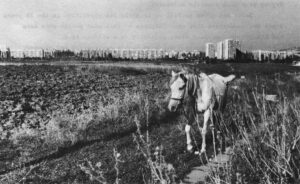
An Apartment in Sofia is Crowded
Sofia – Sofia is almost a metropolis and almost a village. Turkeys scrabble in the unpaved street of a new 10-story apartment house. A herd of cows regularly stops later afternoon traffic on the beltway. It is a European capital city of almost a million residents, but Sofia remains oddly close to the soil. For instance, each new apartment – and practically all of Sofia is new apartments – must by law have a room in the basement called the winter room. In the winter room bureaucrats and factory workers put down each autumn the winter’s supply of pickled tomatoes and cucumbers. On a Sunday afternoon the streets are full of families bringing home nuts and wine and apples from “the village.” Strings of red peppers hung drying over drab concrete balconies. Sofia has grown so fast – tripling its population in the 25 years since the communists took over Bulgaria – that most people were born and brought up someplace else, generally on a village farm. Bulgarian communism has been highly centralized and planned,
The Missing City Solutions
We seem to lack not only answers to some most pressing questions, but also useful ways of asking them Paris, October 11, 1969 “And just what is it you do, Mr. Barnes?” The question wants a snappy answer like “European sales, Acme Can.” Somehow, “I try to understand how different cities cope with change” is an answer that gets lost in the rattle of ice cubes. The trade of studying cities lacks a name. It also lacks a definition. But there are quite a few of us who practice it, in various ways. The city editor, the city planner, the mayor, Lewis Mumford and Jane Jacobs each “know the city,” and trade on their ability to understand how it works. They don’t agree. Not only is there discord over which measures will solve what troubles; they understand quite different things by the word city itself. One definition will be geographical, another social, a third political. All will be right. All will omit aspects that obviously cannot be ignored. Each of us works out something
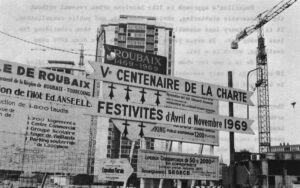
Renewing Lille
LILLE – This is a city that boomed a hundred years ago. They couldn’t build workers’ houses fast enough. Now the coal mines are closing and the factories are antique. The houses built in such a hurry are the same hovels they were, and just as full of people as ever. Lille-Roubaix-Tourcoing, three cities now a single complex of a million people, built its commerce and its spinning on the steam engine and the coal mines of Pas de Calais, just to the south. With the steam engine gone, and the coal mines no longer economical, renewal is needed if Lille is to survive. To attract the plastics and electronics industries that are to be Lille’s rebirth requires shiny buildings. So they are being built. There is money to be made, and the industrious Lillois mean to make it. Renewal of the housing is harder. The setup, peculiar to this region of the north of France, is called a couree. A couree is the backyards of a city block packed tight with hovels. The hovels
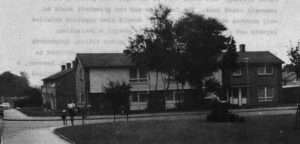
Not A Dream, A Real Place
September 5, 1969 BRACKNELL, Berks – For a famous place, Bracknell new town is strikingly ordinary. The main sights for the 2000 visitors who toured through last year were shoppers, children playing, and hundreds on hundreds of neat houses with flower gardens in front. The phrase new city or new town has come to have a certain cachet. It brings to mind sharp-angled architecture rising from a flat horizon. A new city is a fresh start, without slums, or old people, or people out of work, or people the wrong color – all errors of the past not to be repeated. Living the properly ordered life, new city citizens will approach ever closer to redemption. And nowadays, the phrase is often a pitch-man’s come-on, a slogan for the promoter with too many houses to unload. Bracknell is none of these. It is a new town that actually exists, one of eight surrounding London and 27 in Britain. Some 33,600 people live there now, 30 miles west of London, and 60,000 will in a few
